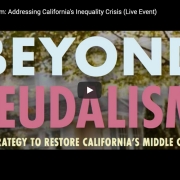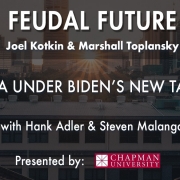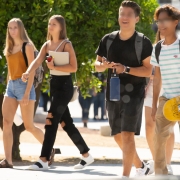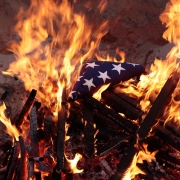History Matters
If history is deprived of the Truth, we are left with nothing but an idle, unprofitable tale.
~Polybius, The Rise of the Roman Empire
Listen to this article:
History has moved to the front line of social conflict, but rarely has it been so poorly understood and sketchily taught. After decades of declining interest, only 13 percent of eighth graders achieve proficiency in the subject today. The New York Times reports that “about 40 percent of eighth graders scored ‘below basic’ in U.S. history last year, compared with 34 percent in 2018 and 29 percent in 2014.” This phenomenon can be seen across the West. The study of and interest in the past, noted the Economist in 2019, has largely disappeared in the UK. Study of the 19th century, meanwhile, seems to be vanishing from European classrooms. “We are in danger of mass amnesia, being cut off from knowledge of our own cultural history,” noted the late Jane Jacobs in her 2004 book, Dark Age Ahead. When I show my students a picture of Lenin, barely one-in-ten of them recognize it.
Universities should be beacons of dispassionate learning, so it is particularly unfortunate that they have also been increasingly complicit in obliterating much that is valuable to historical instruction and understanding. In a 2013 article for the Guardian, Ashley Thorne lamented that university curricula were largely ignoring the literary classics. At many US colleges, Thorne noted, books written before 1990 are considered “inaccessible” to students. This breaks a vital link with the past that allows students to identify with their ancestors as part of an ongoing human story, rather than simply dismissing their thoughts and actions as alien, unintelligible, or even intrinsically evil.
The problem is further exacerbated by the much-discussed decline in academic viewpoint diversity, particularly in the social sciences and humanities. The history profession was once famously disputatious, but over the last generation or so, a diminishing number of conservative or even centrist historians has produced monocultural groupthink. A national survey of faculty members from 183 four-year colleges and universities, conducted in 2005, found that liberals were already seven times more numerous across history departments than conservatives. Without the cut-and-thrust of lively historical debate, history risks becoming an ideological discipline, as was the case in the Soviet Union or China today, taught by rote and incapable of generating excitement and interest.
The consequent decline in historical understanding suggests that generations of students will leave higher education ill-prepared to engage or even bother with the past. The 2018 Programme for International Student Assessment found that 86 percent of 15-year-olds are unable to tell the difference between opinion and fact. This lack of preparation empowers propagandists, who often know little about history to start with, to twist the past to suit their own ideological purposes for an equally ignorant audience.
Less remarked upon is the impact that this ignorance can have on how we understand our present and future. An understanding of the past that dwells exclusively on our crimes, mistakes, and failures at the expense of our achievements produces a distorted picture of human potential and an unwarranted sense of despair. This is particularly evident in the pessimism with which younger generations approach issues like race relations, climate change, and the continuing viability of liberal democracy. For if there is no hope to be found in the past, what possible hope can there be for the future?
Race Relations
Critics of traditional history instruction on matters related to race do sometimes raise valid points. Past school curricula distorted history in its own ways, particularly by ignoring the contributions of Asians and Hispanics as well as indigenous groups like Native Americans and Africans. A controversial claim made by one historian in the Washington Post (specifically, that neither Roosevelt nor Churchill opposed Nazism for its commitment to racial supremacy) may have provoked outrage from right-wing pundits, but the point was not entirely misplaced.
Ignorance and the willful politicization of historical debate, however, have also led to some outright fabulism. Vice President Kamala Harris inflamed the dispute over Florida’s history guidelines by falsely alleging that they mandate an outrageously revisionist account of American slavery. The Telegraph recently reported that, at Cambridge, students are being taught that “Anglo Saxons aren’t real” due to the term’s allegedly problematic ethnic connotations. Indigenous leaders in the Commonwealth have recently demanded that King Charles apologize for crimes committed long before he was born. And of course, there are ongoing efforts to redefine July 4th as a moment for national shame and atonement rather than celebration.
Read the rest of this piece at Quillette.
Joel Kotkin is the author of The Coming of Neo-Feudalism: A Warning to the Global Middle Class. He is the Roger Hobbs Presidential Fellow in Urban Futures at Chapman University and Executive Director for Urban Reform Institute. Learn more at joelkotkin.com and follow him on Twitter @joelkotkin.
Photo credit: African American children learning about Thanksgiving, with model log cabin on table, Whittier Primary School, Hampton, Virginia. Photograph by Frances Benjamin Johnston, [1899 or 1900]. Library of Congress Prints & Photographs Division.

![African American children learning about Thanksgiving, with model log cabin on table, Whittier Primary School, Hampton, Virginia. Photograph by Frances Benjamin Johnston, [1899 or 1900].](https://joelkotkin.com/wp-content/uploads/2023/09/Thanksgiving-180x180.jpg) Library of Congress, in Public Domain
Library of Congress, in Public Domain






